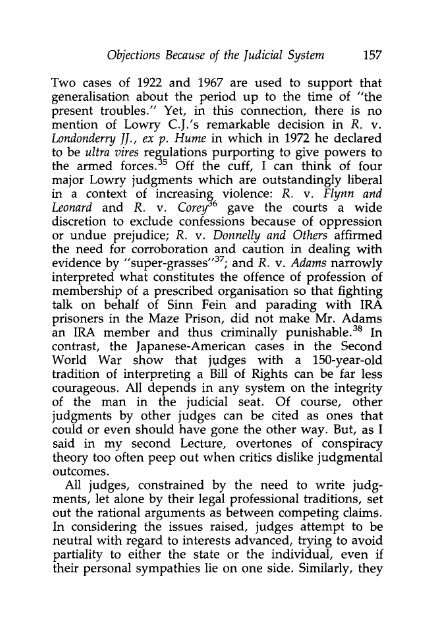The United Kingdom and Human Rights - College of Social ...
The United Kingdom and Human Rights - College of Social ...
The United Kingdom and Human Rights - College of Social ...
You also want an ePaper? Increase the reach of your titles
YUMPU automatically turns print PDFs into web optimized ePapers that Google loves.
Objections Because <strong>of</strong> the Judicial System 157<br />
Two cases <strong>of</strong> 1922 <strong>and</strong> 1967 are used to support that<br />
generalisation about the period up to the time <strong>of</strong> "the<br />
present troubles." Yet, in this connection, there is no<br />
mention <strong>of</strong> Lowry C.J.'s remarkable decision in R. v.<br />
Londonderry }],, ex p. Hume in which in 1972 he declared<br />
to be ultra vires regulations purporting to give powers to<br />
the armed forces. Off the cuff, I can think <strong>of</strong> four<br />
major Lowry judgments which are outst<strong>and</strong>ingly liberal<br />
in a context <strong>of</strong> increasing violence: R. v. Flynn <strong>and</strong><br />
Leonard <strong>and</strong> R. v. Corey gave the courts a wide<br />
discretion to exclude confessions because <strong>of</strong> oppression<br />
or undue prejudice; R. v. Donnelly <strong>and</strong> Others affirmed<br />
the need for corroboration <strong>and</strong> caution in dealing with<br />
evidence by "super-grasses" 37 ; <strong>and</strong> R. v. Adams narrowly<br />
interpreted what constitutes the <strong>of</strong>fence <strong>of</strong> pr<strong>of</strong>ession <strong>of</strong><br />
membership <strong>of</strong> a prescribed organisation so that fighting<br />
talk on behalf <strong>of</strong> Sinn Fein <strong>and</strong> parading with IRA<br />
prisoners in the Maze Prison, did not make Mr. Adams<br />
an IRA member <strong>and</strong> thus criminally punishable. 38 In<br />
contrast, the Japanese-American cases in the Second<br />
World War show that judges with a 150-year-old<br />
tradition <strong>of</strong> interpreting a Bill <strong>of</strong> <strong>Rights</strong> can be far less<br />
courageous. All depends in any system on the integrity<br />
<strong>of</strong> the man in the judicial seat. Of course, other<br />
judgments by other judges can be cited as ones that<br />
could or even should have gone the other way. But, as I<br />
said in my second Lecture, overtones <strong>of</strong> conspiracy<br />
theory too <strong>of</strong>ten peep out when critics dislike judgmental<br />
outcomes.<br />
All judges, constrained by the need to write judgments,<br />
let alone by their legal pr<strong>of</strong>essional traditions, set<br />
out the rational arguments as between competing claims.<br />
In considering the issues raised, judges attempt to be<br />
neutral with regard to interests advanced, trying to avoid<br />
partiality to either the state or the individual, even if<br />
their personal sympathies lie on one side. Similarly, they

















